There is a language to picking salmon out of a gillnet. During the summer of 2017, I spent 6 weeks on a fishing boat in Bristol Bay, Alaska, and learned a little bit of this language. It is an act of reading.
The story of fish in a net… well, when I started, I was illiterate.
The other men on the boat told me the basics- “Grab the lead-line and bear-paw the web until you get to the fish,” they told me. “Most of the time, the fish will fall out of the net if you do this.”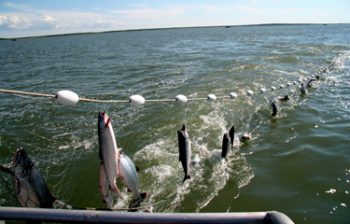
They were right, of course. Strangely enough, I found it counter-intuitive to grab the lead-line. I wanted to go straight for the fish! And every time I did, I found I couldn’t figure out how to free it. I had to start at the lead-line, every time. As I realized this, and made myself approach the fish from the lead-line, and only from the lead-line, slowly, I began to understand the way the net worked, and the way the fish died in it, and how to remove the fish from the net.
There is only one way for a fish to die in a net, and that is to drown. It strikes me as a vicious irony- that a fish can drown! But indeed, the manner of dying in a net is suffocation under water. The ways in which a fish can suffocate are simple, and gruesome in their simplicity. When a fish is caught by its gills in the web of the net, the web itself prevents the fish from being able to flex the muscles within the its throat and gill-plates that allow a free flow of oxygenated water to reach the intricately folded gill fringes. Imagine being squeezed by an anaconda so that you can’t fill your lungs with air.
Do fish have feelings? Many claim they do not. But simple reason seems to claim otherwise. If a fish can feel panic and desperation, then it stands to reason that it can feel more positive emotions- joy, elation, serenity. One of the signs a fisherman looks for are “jumpers”, salmon that literally jump out of the water. Why do they jump? Most fishermen will say that they are crowded by the other fish, and being pressed by the school, they throw themselves into a prodigious leap out of the water and into the air.
Might a fish jump out of sheer exuberance?
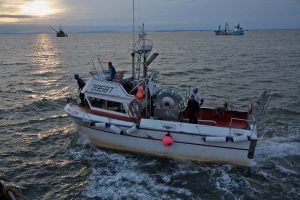 Could it be that the fish is jumping out of joy, having sensed that primal urge to go somewhere, a particular place, and then, after a long journey of focused intention, to actually reach the outskirts of that place, to know this, to smell this…could the simple joy of returning home cause a fish to leap out of the water?
Could it be that the fish is jumping out of joy, having sensed that primal urge to go somewhere, a particular place, and then, after a long journey of focused intention, to actually reach the outskirts of that place, to know this, to smell this…could the simple joy of returning home cause a fish to leap out of the water?
Some science does back me up on the notion that most, if not all living creatures experience their environment as a series of emotional reactions. What is pain, if not an emotion, a “feeling”? Even a flatworm can experience pain. And if pain, then why not pleasure? Things taste good, or bad. Fish have taste preferences, and taste, like smell, is experienced primarily as an emotion. In fact all of our senses have an emotional component to them. Is not the kaleidoscope of emotion the screen upon which our sense impressions play?
Recent studies suggest that even trees have awareness, that they sense changes in their environment, and respond to them. Of course we all know higher mammals have emotions, and that their emotional natures are much more refined and sensitive than ours are. A dog’s entire existence is played out in the rich arena of emotion, rather than in the sterile confines of reason.
To me, it is entirely possible that a salmon jumps out of the water out of a sense of joy that is impossible to express or release in any other way. It is the salmon’s dance, it’s exulting cry to the universe that it is alive, and fulfilling its purpose for being here.
And of course, I see the jumper, and call out from the deck to the skipper, “Jumper, headed uphill, 100 yards, 11 o’clock!”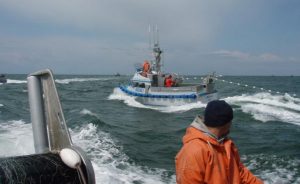
There are fish over there! Excitement! Anticipation, emotion! And we go there and throw the ball over, lay out 200 fathoms of gillnet, and kill more fish.
I stand on the back deck, behind the reel, out of the wind, and I consider my reaction, the first time a school of salmon hit the net. As the fish encountered the net, the corkline erupted in an explosion of froth and spray, as the fish fought in vain for their lives and purpose. We could see the black forms of the fish themselves, as they thrashed and twisted to free themselves from the net.
I was shocked by the violence of the death, the fierceness of the fishes’ struggles to free themselves. I said to myself, “Has anyone asked permission, or given thanks, to the salmon people?”
I am now far beyond the bounds of science, or anything remotely resembling science. I know of no scientific discipline than can countenance such a question. My scientifically minded friends might say something like, “We resist the temptation to anthropomorphize nature.” or, if they are feeling more conciliatory, they might say, “Yes, we have had similar emotional reactions. Often we find ourselves outraged or depressed at the impact of human beings on the natural world. But we are charged with an ethical responsibility to remain impartial, to make sure our emotional reactions do not color our findings, or impel us to slant our observations in any one particular direction.”
In the little river mouth towns along the shores of Bristol Bay, Naknek, Egegik, Dillingham, Port Moller, and other, even smaller places, massive cannery complexes line the shores, staffed with hundreds of cannery workers from every corner of the globe. These factories are full of complicated machinery and roaring generators, steam-belching smokestacks and every other manifestation of human cleverness and creative power of invention. These plants are all there for one reason- to take the salmon caught by 1000 fishing boats and turn those fish into a food commodity to be eaten by other human beings. Why do they do this? To make money.
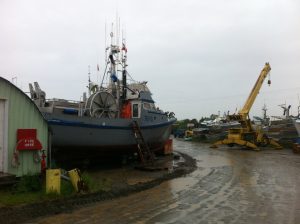 It staggers my mind to think about the massive outlay of capital, industrial might, and human energy that manifests itself to catch salmon in the planet’s most productive salmon fishery. Literally, more salmon are caught and processed out of Bristol Bay than out of all the other wild salmon fisheries in the world combined.
It staggers my mind to think about the massive outlay of capital, industrial might, and human energy that manifests itself to catch salmon in the planet’s most productive salmon fishery. Literally, more salmon are caught and processed out of Bristol Bay than out of all the other wild salmon fisheries in the world combined.
The scope of human endeavor that is arrayed in the quest for salmon really is that massively impressive. It completely overshadows the fish for which it is intended. One can almost imagine that the entire edifice could run on its own inertia if the fish ever disappeared.
But it can’t. Underpinning all of the human endeavor are the salmon themselves. If the fish were to disappear, so would the people, like smoke. They would vanish in the space of months, and all of the weight of human ingenuity, labor, and creativity would collapse, wither away and vanish, leaving nothing but abandoned hulks of worthless machinery to rot and rust in the mud. This thought is even more staggering to me- that we humans really are utterly dependent upon the natural world, and that all of our technology and accomplishments really boil down to daily bread, and little more.
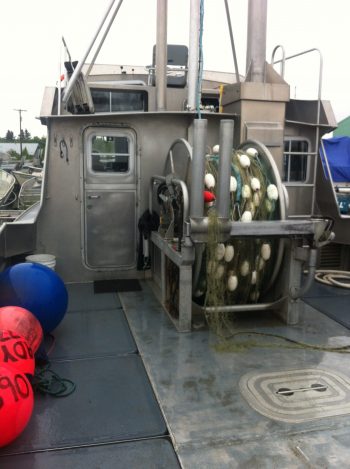 Because the salmon must be preserved, in order that the human structures that depend on them can be preserved, the State of Alaska maintains an aggressive and motivated police force to ensure that no fisherman breaks any of dozens of regulations designed to protect the salmon runs in Bristol Bay. The Bristol Bay salmon fishery is one of the most heavily regulated and thoroughly policed fisheries in the world. Without this regulatory oversight, humans would destroy the fishery in matter of years. How long would it take for man to decimate the fishery? I guess it would take less than a decade.
Because the salmon must be preserved, in order that the human structures that depend on them can be preserved, the State of Alaska maintains an aggressive and motivated police force to ensure that no fisherman breaks any of dozens of regulations designed to protect the salmon runs in Bristol Bay. The Bristol Bay salmon fishery is one of the most heavily regulated and thoroughly policed fisheries in the world. Without this regulatory oversight, humans would destroy the fishery in matter of years. How long would it take for man to decimate the fishery? I guess it would take less than a decade.
Every fisherman, every cannery worker, every person who works in a support capacity for the fishery as a welder, librarian, storekeeper or waitress, knows that a certain number of fish must escape upriver to spawn, and thus, support future salmon runs. Why then, would the fishery be destroyed without regulation, given that this basic fact of biology is recognized by virtually everyone involved?
It is because of a fundamental flaw in human nature. I’ll call it the Law of the One Who Doesn’t Care. If every fisherman, but one, self-regulated themselves, and caught only a sustainable number of fish; if but just one fisherman caught all the fish he wanted to, or could; if just one fisherman didn’t care about the sustainability of the fishery, then the temptation for others to abandon their voluntary self-restraint would be impossible to resist. As one by one, more and more fishermen gave in to the lure of unrestricted harvest, the pressure to fish on the ones still adhering to self-restraint would become impossible to resist.
The ethical fishermen would not give in out of greed, or the desire to capture a windfall, but instead, out of the need to get at least some! If those remaining fishermen don’t leap into the fray, if they don’t abandon of the idea of sustainability, there won’t be any fish left for them to catch.
It is the same psychology that leads to the collapse of stock markets. It is analogous to studies in chaos theory that attempt to predict avalanches. This law of the One Who Doesn’t Care, this flaw of human group psychology, spells the doom of all efforts at self-regulation, especially in the arena of natural resource extraction.
I read article after article in various environmentally oriented publications that tell me we have a climate crisis, a nuclear waste crisis, an energy crisis, a food crisis, a toxic waste crisis, a pesticide crisis, a bee crisis, a population crisis, a child-labor crisis, a topsoil erosion crisis, a sexual-assault crisis, a forced labor crisis, a fresh-water crisis… what can we do about it?
I would gently suggest that , well, nothing really. The monster we are fighting is us. It lives in each one of us. The reality is that everything is connected. There are no impact-free actions. Period. I am a resource extractor, and a primary producer. I am a fisherman, and a farmer. The dreary bumper sticker that miners and farmers have on their pickup trucks is true: If it isn’t grown, it must be mined.
And my mind keeps returning to the emotional life of a fish! Perhaps the answer to how we can (perhaps someday) control ourselves lies in the ability to comprehend the emotional life of others. Those others might be fish, or they might be human beings. It seems that mostly, we are engaged in one variety of revenge or another, or in complicated schemes to force others to see our point of view, to understand us, and mostly, we want them to feel bad, and try to make them feel bad, so that they can understand how bad we feel!
It seems that in the end, everyone feels bad, and no-one understands the feelings of anyone else. We are all trapped, alone, in our personal and solitary maze of trauma.
The emotional life of fish… the inability to understand it cuts both ways. The fisheries biologists who count fish, who capture and measure fish, who dissect and study fish, who take water samples, study genetics, fish diseases- to them the fish is just as much an abstraction as it is to the fisherman. If the fish to a fisherman is just a seven dollar bill, and if that seven-dollar bill is the only reason he’s fishing, then the fish to the scientists is simply a different kind of number.
So, I can see that in today’s climate of reductionist logic, ie science, the worship of data, numbers, and all other abstracted forms of information, emotion is not to be trusted. And yet, at the heart of every matter, isn’t our emotional response the very thing that drives us, either to catch the fish, or to count the fish?
We can’t do away with the data. But it seems we have done away with the connection- because the connection happens only through the avenue of emotion. What do I, a human being, have in common with a fish, a tree, an elk, a beaver? Can I put myself in the place of this Other, can I begin to understand that being’s reality?
Can I imagine the first scent of fresh water, the stir of ancient genetic memory as that change in flavor, in electrical potential, begins to activate a cascade of gene triggers within my body, making me realize, with nothing but hormonal changes, that I am fulfilling a life purpose deeper and more meaningful than anything I have ever done before? I can imagine it. I can feel the joy of that moment as it courses through my body, as I sense other fish, sense their excitement, their similarity of emotional recognition. It thrills me with joy- I’m home! I’m home!
The emotion is too much to contain- the fish is free- why should she not fling herself into the air? How else is she going to express the happiness she feels, the knowledge that she is heavy with roe, that her life has reached a denouement, a thrill of fulfillment that perhaps as humans, we will never really experience with such a totality of force? Why should she not throw herself into the air? Who hasn’t spontaneously leapt with joy at some point in their lives?
I do imagine this sort of emotional literacy was, once a long while back, more common than it is now. I think we once had the ability to read the emotional lives of others. And if we once did, we still can, it’s down in there, buried under the dead weight of our overdeveloped logic.
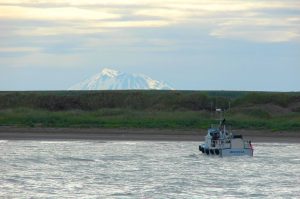 A friend of mine who spends a lot of time in the wilderness speaks of this as “baseline”. It is that act of adapting oneself to the pace of the natural world, of becoming so at one with the environment that animals return to their normal routines with humans as their new neighbors. I’m no good at it. I’m too distracted within by my own dialog of pain, too steeped in the world of human extraction, too attuned to the rhythm of machine and money. But I can take a moment to recognize this was once how we all lived.
A friend of mine who spends a lot of time in the wilderness speaks of this as “baseline”. It is that act of adapting oneself to the pace of the natural world, of becoming so at one with the environment that animals return to their normal routines with humans as their new neighbors. I’m no good at it. I’m too distracted within by my own dialog of pain, too steeped in the world of human extraction, too attuned to the rhythm of machine and money. But I can take a moment to recognize this was once how we all lived.
I imagine our ancestors were much more informed by the emotional lives of the creatures they encountered than we are. By living closely with them they witnessed the daily lives of their non-human neighbors on a level of resolution we rarely experience. They saw baby skunks being born, saw turtles trapped in tree roots, saw the mating dances of sage grouse, all first hand. If we see these things at all, it is through the filter of a video screen, the second hand report of one person who has taken the time to do this for us.
I think this is where the ecology of emotion comes into play. Our current understanding of ecology recognizes a cause and effect interrelation between living things. The growth of trees affects the life cycle of voles. This is well understood in terms of science, in terms of data and facts, and so far, an understanding of ecologic principles has filtered down into society to such an extent that even uneducated fishermen such as myself can understand it.
But so far, this hard data understanding of ecology has not changed our behavior as a species. I say it is because we are illiterate. We cannot read the emotional lives of the creatures we share this planet with. If we could read them, if we could understand them, then we might respect them. 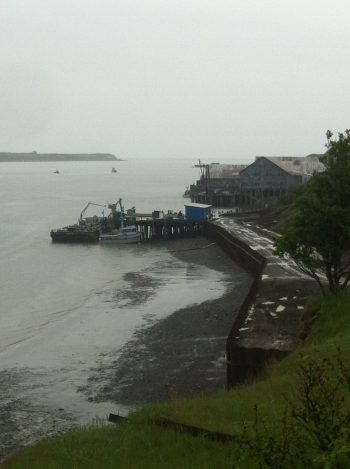
But of course, we have to start with the basics. Gaining a ecology of emotion has to begin with us, human to human. If I don’t grab the lead-line, start at the margins, if I can’t understand another human’s emotions, how am I ever going to understand the emotions of a fish?
If we can learn to do this with people, then we can learn to do it with animals. If we learn that understanding animals benefits us, just as understanding other humans benefits us, then maybe we won’t want to eat them. Or, if there is a place for eating animals, we will do so with such consciousness, that eating flesh would be a sacred and holy affair.
We could then watch fish for entirely different reasons- because we wish to have a relationship with them and to enter into their joy in some way.
The ecology of emotion would transform fishing from a harvest into a sacred and holy endeavor. Every fish caught would be caught with a conscious understanding that the fish agreed to die so that humans might live. The fisherman, the cannery worker, and the eater- all would be humbled by the thought of such self-sacrifice. It is truly Christ-like, and we would understand the giving of one’s life, even the life of a fish, in just such a manner. The eating of the flesh of a fish would truly become a holy communion.
And we could read the lives of others in ways more true to the bond between us all. It would be the reading of a fish’s joy, an understanding of its life and difficulty, it’s challenges, its goals. It would no longer be merely a story of how the fish was trapped, and how it died. It would be a story of how the fish lives and breathes and loves.
All of this sounds absolutely impossible, and worse, it sounds hopelessly romantic, a fool’s wish for a world that probably never has, and most likely never will, exist. But why not? If we can imagine it, we can do it.
I’m not suggesting anything more or less than the notion that non-human creatures have an emotional life. That’s all! The connections that can be made between the ability to feel, and one’s own personal ethics, and the down-line decisions that might be made are the individual’s to make, and no-one else’s. I’ll probably go fishing again, because I need the money, and because I know how to do the job. But I know, as I grab the lead-line, and read how the fish suffocated in the net, I’ll think about how that fish felt, how it went from joy to panic to exhaustion to death. And maybe, I might not raise a cry at the next time I see a salmon jump free from the water, in a leap of joy that I wish I might, someday… experience myself.
Loch Wade has worked as a commercial fisherman, a locomotive mechanic, an airline pilot, and a hay farmer in Boulder, Utah. He was the first and so far, the only person to paddle a kayak across the Continental United States, alone and without any mechanical assistance. He was the first person since 1848 to travel the entire length of the Old Spanish Trail on foot.

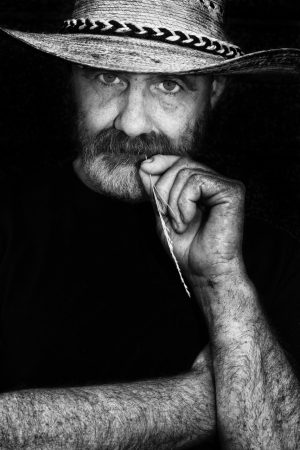


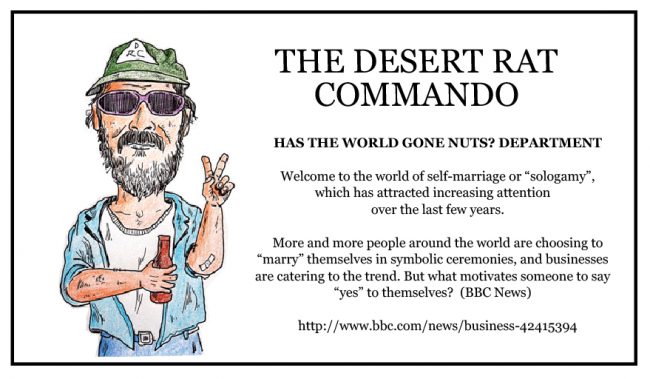




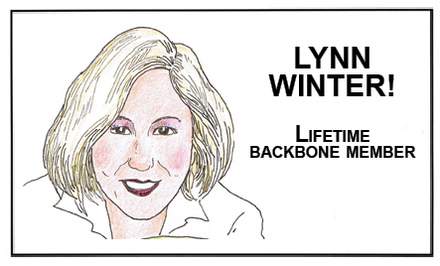
Beautiful! Thank you
Ask anyone who has an aquarium about the emotional lives of fish. I think they will tell you stories about their pets that are similar to a dog owner’s stories.
Beautifully written, Loch!
great writing Lochity Loch
So close to perfect…I mean of positioning positive and transcendent emotion as the center of the eternal value of de anima.
Why did evolution make sex so exciting? Because excitement ennervates, compels. Our emotions are evolution’s way of telling us what we ought to do as nature understands what we ought to do based on the data it has accumulated in our DNA–whether we be trillobite, salmon, or human–over trillions of trillions of generations.
Nevertheless, despite the awareness that salmon and human and tree and bacterium are one, nature does not and cannot compel us to do the right thing–to do as we ought to do.
We are as free to kill salmon to feed the production machine as German soldiers were to kill children to feed the Nazi machine.
Loch, great point of view. Bristol Bay and salmon are the greater part of my family history. More than a century ago Grampa Oscar started there and some family is still fishing. A fishery has never been better managed. The love for the fish may have been kinda Lutheran is its expression but it was still there.
Well written. Great perspective and insight.
I just came back from a veterans retreat and watched how 10 men’s lives were changed. I read your beautiful message about the lives of salmon and how much you respect their lives. I sense being on this earth is a privilege and when we respect ourselves we respect others. And beneath those words there is a silence into which the world cannot intrude. There is an ancient peace we carry in our hearts and have not lost. Be the jewel hiding in the stone. Let your heart be the jewel that leads your life, bringing peace and love to all areas of life as if touching the unending sky. My heart to your heart.
Hi Loch – several years ago you repaired a cooling unit for me on Bainbridge Island. Are you still doing repairs? I have an Isotherm CR195 refrigerator/freezer on my boat that needs help. The freezer portion works fine, but the refrigerator part is not cooling adequately. Please let me know if you are still doing this kind of work.
Thank you!
– Henry